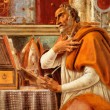The Philosophical Landscape of “Westworld”
by Matthew Becklo
Filed under Movies/TV

At the halfway point of HBO’s unsettling new series Westworld – a J.J. Abrams reboot of the 1973 film written and directed by Michael Crichton – some big plot questions remain. Is William a younger Man in Black? Is Bernard really a host? And what’s this maze all about? The premise of the show is (relatively) straightforward: In the distant future, scientists and businessmen collaborate to create a vast amusement park in the style of the Old West, populating it with artificially... Read More
Why Reality Includes More (Not Less) Than You May Think
by Dr. Peter Kreeft
Filed under Belief

The most usual position among philosophers in the Western world today, in fact the most usual position among academics generally, is some kind of reductionism. By “reductionism” I mean simply the belief that the world-view, or implicit metaphysics, of most people, or ordinary people, especially people of previous eras and cultures, errs by believing too much; that Hamlet’s Shakespeare was exactly wrong when he said to Horatio that “there are more things in heaven and earth than... Read More
Does Religion Really Have a “Smart-People Problem”?
by Bishop Robert Barron
Filed under New Atheists, Religion

Daniel Dennett, one of the “four horsemen” of contemporary atheism, proposed in 2003 that those who espouse a naturalist, atheist worldview should call themselves “the brights,” thereby distinguishing themselves rather clearly from the dim benighted masses who hold on to supernaturalist convictions. In the wake of Dennett’s suggestion, many atheists have brought forward what they take to be ample evidence that the smartest people in our society do indeed subscribe to anti-theist... Read More
Augustine’s “Confessions” and the Harmony of Faith and Reason
by Carl Olson
Filed under Faith

Pope Benedict XVI dramatically underscored the importance of St. Augustine of Hippo (354-430) recently. In a series of general audiences dedicated to the Church fathers, Benedict devoted one or two audiences to luminaries such as St. Justin Martyr, St. Basil, and St. Jerome, while dedicating five to Augustine. One of the greatest theologians and Doctors of the Church, Augustine’s influence on Pope Benedict is manifest. "When I read Saint Augustine’s writings," the Holy Father stated... Read More
A Cinematic Tour of the Problem of Evil
by Matthew Becklo
Filed under The Problem of Evil

Is God willing to prevent evil, but not able? Then he is not omnipotent. Is he able, but not willing? Then he is malevolent. Is he both able and willing? Then where does evil come from? Is he neither able nor willing? Then why call him God? — Epicurus Gruesome and tragic headlines from the past few months have thousands of people of faith scratching their heads, asking: why does God allow this evil to happen? Isn't he supposed to be all-loving and all-powerful? The question... Read More






